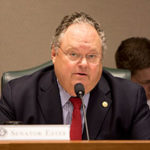AUSTIN—In the 84th session of the Texas Legislature, lawmakers passed bills protecting ministers from being forced to participate in same-sex marriages and giving county law enforcement greater ability to crack down on illegal gaming rooms.
CLC Director Gus ReyesOfficials with the Texas Baptist Christian Life Commission expressed appreciation to state legislators for those advances—and to lawmakers who helped block bills that would have repealed the Texas DREAM act, banned so-called “sanctuary cities” and diverted public funds to private religious schools.
At the same time, they expressed concern the legislature failed to enact meaningful reform of the payday loan and auto-title lending industry.
Religious liberty
In response to concerns the U.S. Supreme Court may overturn the state’s ban on same-sex marriage, legislators overwhelmingly approved a measure that stipulates a minister cannot be required to officiate at a marriage ceremony if it violates his or her sincerely held religious beliefs.
As approved, the bill states: “A religious organization, an organization supervised or controlled by or in connection with a religious organization, an individual employed by a religious organization while acting in the scope of that employment, or a clergy or minister may not be required to solemnize any marriage or provide services, accommodations, facilities, goods or privileges for a purpose related to the solemnization, formation or celebration of any marriage if the action would cause the organization or individual to violate a sincerely held religious belief.”
The bill—now awaiting Gov. Greg Abbott’s signature—also says refusal to provide services or facilities for such a wedding cannot be the basis for civil or criminal action.
“It is good news that the Texas Legislature affirmed pastors’ freedom to preach and practice biblical truth as God leads them to do without interference,” CLC Director Gus Reyes said.
Immigration
Sign up for our weekly edition and get all our headlines in your inbox on Thursdays
Efforts to repeal the Texas DREAM (Development, Relief and Education for Alien Minors) Act failed. The proposal would have amended state law so undocumented students could not be considered Texas residents for the purpose of receiving in-state tuition at a public institution of higher education.
A broad coalition of educators, university administrators and religious leaders—both Anglo and Hispanic—spoke in support of the Texas DREAM Act, Reyes noted.
A bill to ban so-called “sanctuary cities” also failed. Some lawmakers wanted to eliminate the possibility local rules could prohibit police from questioning detained individuals about their immigration status. Religious leaders who opposed the measure asserted it would lead to racial profiling and break down trust between communities and law enforcement.
Tension evident during the session centered on whether the federal government or state government bears responsibility for immigration issues, Reyes noted.
“That tension is elevated, and it’s not going to go away until things are settled on the national level,” he said.
Predatory lending
Efforts to reform payday lending and auto-title lending—either through bills specifically devoted to enacting regulations modeled after ordinances in 22 Texas cities or through an amendment to a consumer credit bill—fell short, said Rob Kohler, legislative consultant with the CLC.
In the final days of the session, Rep. Tom Craddick, R-Midland, announced his intent to amend a consumer credit bill to ensure fair product affordability standards by limiting loan size based on a borrower’s income and establishing a clear pathway to repayment.
However, Rep. Tan Parker, R-Flower Mound, sponsor of the consumer credit legislation, postponed its consideration and sent it to committee, effectively killing it for the session.
“It’s unfortunate that we didn’t get a swing at the plate,” Kohler said. “It’s an important issue. These are families who are already in desperate circumstances, and the lenders’ business model traps these folks in a cycle of debt. That doesn’t help anybody in the long run.”
Even so, proponents for reform hope to build on momentum created during the legislative session.
“Many calls went into House offices in support of the Craddick bill, which supports long-term momentum for reform,” said Kathryn Freeman, CLC public policy director.
Advocates of reform also “successfully stopped a bill with a lot momentum that would have allowed certain subprime consumer lenders to tag on life insurance to a consumer loan,” she added.
Gambling
Kohler pointed to positive signs in terms of stopping expansion of gambling in Texas. No significant legislation passed that would have expanded gambling enterprises such as casinos or casino-style gambling machines in Texas.
Lawmakers approved one bill intended to stop the proliferation of illegal game rooms that operate eight-liners, sweepstakes machines and other gambling devices. Based on a model already in place in Harris County, the legislation expands the authority of law enforcement to include adjacent counties as they seek to shut down the illegal game rooms.
Although the Harris County regulation has been challenged in court, Kohler expressed hope Abbott would sign the bill the legislature approved.
Public education
Advocates of public education and supporters of church-state separation successfully blocked a bill they maintained would divert public funds to private faith-based schools. Although the measure advancing what proponents call “taxpayer savings grants” or “school choice” passed in the Senate, it never gained ground in the House.
“It’s important to note we are not against school choice as such,” said Ferrell Foster, associate director of the CLC. “We are against vouchers or any other approach that funds private religious education with state dollars.”
Charles Foster Johnson, executive director of Pastors for Texas Children, expressed appreciation to the elected officials who served in the 84th Texas Legislature, noting “very little legislation that is bad for public school children was passed.”
Johnson applauded Abbott for his successful effort to enhance early education in Texas—one of the emergency items he identified as priority earlier this year. He signed a bill that sets aside $130 million over two years for school districts whose pre-kindergarten programs meet certain criteria.
However, Johnson expressed regret lawmakers failed to restore fully the funding for public education cut in the previous legislative session.
Texas “can and must do better to provide quality education for all our children,” he insisted.
“We are dismayed to learn not only that Texas lags behind the rest of the country in public education funding, but also that here is an orchestrated strategy to dismantle public education as we have known it and privatize it into a profit-making enterprise,” Johnson said.
“As ministers and faith leaders, we dedicate ourselves to bearing bold witness to our policymakers that education is a gift from Almighty God, a basic human right, a constitutionally provided public benefit and a fundamental component of God’s common good mandated in Holy Scripture and moral tradition.”














We seek to connect God’s story and God’s people around the world. To learn more about God’s story, click here.
Send comments and feedback to Eric Black, our editor. For comments to be published, please specify “letter to the editor.” Maximum length for publication is 300 words.